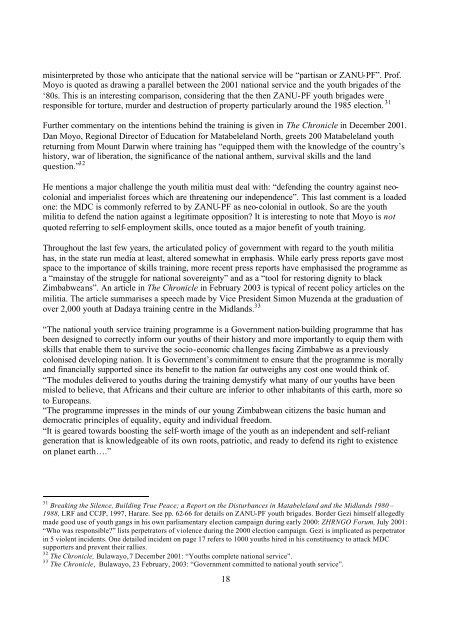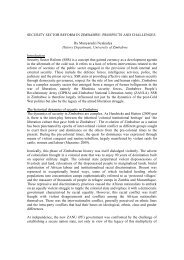National youth service training - Solidarity Peace Trust
National youth service training - Solidarity Peace Trust
National youth service training - Solidarity Peace Trust
You also want an ePaper? Increase the reach of your titles
YUMPU automatically turns print PDFs into web optimized ePapers that Google loves.
misinterpreted by those who anticipate that the national <strong>service</strong> will be “partisan or ZANU-PF”. Prof.<br />
Moyo is quoted as drawing a parallel between the 2001 national <strong>service</strong> and the <strong>youth</strong> brigades of the<br />
‘80s. This is an interesting comparison, considering that the then ZANU-PF <strong>youth</strong> brigades were<br />
responsible for torture, murder and destruction of property particularly around the 1985 election. 31<br />
Further commentary on the intentions behind the <strong>training</strong> is given in The Chronicle in December 2001.<br />
Dan Moyo, Regional Director of Education for Matabeleland North, greets 200 Matabeleland <strong>youth</strong><br />
returning from Mount Darwin where <strong>training</strong> has “equipped them with the knowledge of the country’s<br />
history, war of liberation, the significance of the national anthem, survival skills and the land<br />
question.” 32<br />
He mentions a major challenge the <strong>youth</strong> militia must deal with: “defending the country against neocolonial<br />
and imperialist forces which are threatening our independence”. This last comment is a loaded<br />
one: the MDC is commonly referred to by ZANU-PF as neo-colonial in outlook. So are the <strong>youth</strong><br />
militia to defend the nation against a legitimate opposition? It is interesting to note that Moyo is not<br />
quoted referring to self-employment skills, once touted as a major benefit of <strong>youth</strong> <strong>training</strong>.<br />
Throughout the last few years, the articulated policy of government with regard to the <strong>youth</strong> militia<br />
has, in the state run media at least, altered somewhat in emphasis. While early press reports gave most<br />
space to the importance of skills <strong>training</strong>, more recent press reports have emphasised the programme as<br />
a “mainstay of the struggle for national sovereignty” and as a “tool for restoring dignity to black<br />
Zimbabweans”. An article in The Chronicle in February 2003 is typical of recent policy articles on the<br />
militia. The article summarises a speech made by Vice President Simon Muzenda at the graduation of<br />
over 2,000 <strong>youth</strong> at Dadaya <strong>training</strong> centre in the Midlands. 33<br />
“The national <strong>youth</strong> <strong>service</strong> <strong>training</strong> programme is a Government nation-building programme that has<br />
been designed to correctly inform our <strong>youth</strong>s of their history and more importantly to equip them with<br />
skills that enable them to survive the socio-economic challenges facing Zimbabwe as a previously<br />
colonised developing nation. It is Government’s commitment to ensure that the programme is morally<br />
and financially supported since its benefit to the nation far outweighs any cost one would think of.<br />
“The modules delivered to <strong>youth</strong>s during the <strong>training</strong> demystify what many of our <strong>youth</strong>s have been<br />
misled to believe, that Africans and their culture are inferior to other inhabitants of this earth, more so<br />
to Europeans.<br />
“The programme impresses in the minds of our young Zimbabwean citizens the basic human and<br />
democratic principles of equality, equity and individual freedom.<br />
“It is geared towards boosting the self-worth image of the <strong>youth</strong> as an independent and self-reliant<br />
generation that is knowledgeable of its own roots, patriotic, and ready to defend its right to existence<br />
on planet earth….”<br />
31 Breaking the Silence, Building True <strong>Peace</strong>; a Report on the Disturbances in Matabeleland and the Midlands 1980 –<br />
1988, LRF and CCJP, 1997, Harare. See pp. 62-66 for details on ZANU-PF <strong>youth</strong> brigades. Border Gezi himself allegedly<br />
made good use of <strong>youth</strong> gangs in his own parliamentary election campaign during early 2000: ZHRNGO Forum, July 2001:<br />
“Who was responsible?” lists perpetrators of violence during the 2000 election campaign. Gezi is implicated as perpetrator<br />
in 5 violent incidents. One detailed incident on page 17 refers to 1000 <strong>youth</strong>s hired in his constituency to attack MDC<br />
supporters and prevent their rallies.<br />
32 The Chronicle, Bulawayo, 7 December 2001: “Youths complete national <strong>service</strong>”.<br />
33 The Chronicle, Bulawayo, 23 February, 2003: “Government committed to national <strong>youth</strong> <strong>service</strong>”.<br />
18




